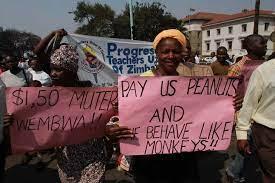News / Local
Zimbabwe teachers to embark on indefinite strike
6 hrs ago | Views

Teachers under the Federation of Zimbabwe Educators Union (FOZEU) have notified the government of their intention to embark on an indefinite strike starting Tuesday, May 26, 2025, citing unresolved grievances, poor working conditions, and meagre salaries.
The educators are demanding a monthly salary of US$1,250, which they say would enable them to live dignified lives and cover the costs of reporting for duty. FOZEU is an umbrella body comprising several unions, including the Amalgamated Rural Teachers Union of Zimbabwe (Artuz), the Education Union of Zimbabwe, the Professional Educators Union of Zimbabwe, and the Zimbabwe Visually Impaired Teachers Union.
The strike decision was made during a meeting held in Harare on Wednesday.
In a letter dated May 21 addressed to Primary and Secondary Education Minister Torerai Moyo, FOZEU secretary-general Obert Masaraure — who also leads Artuz — confirmed the union's plans to down tools and legally assert its members' rights.
"We write to notify you that the Federation of Zimbabwe Educators Union has called for a strike effective May 26, 2025," Masaraure said.
"This industrial action demands an urgent salary review to enable teachers to meet the costs of reporting for duty and to live dignified lives."
Teachers are also planning to stage pickets at their respective workstations, with community support expected, according to the union.
Currently, teachers earn an average of US$250 per month and around ZiG3,000 — an amount FOZEU argues is insufficient to meet basic needs.
Meanwhile, other teachers' unions have different salary demands. Some are pushing for a return to the pre-October 2018 salary of US$540.
An attempt by the National Joint Negotiating Council (NJNC) last week to resolve the salary impasse ended in a deadlock, deepening frustrations among educators.
Responding to the strike notification, Education Ministry spokesperson Taungana Ndoro dismissed FOZEU's actions, labelling them a publicity stunt orchestrated by a fringe group.
"The clamour for a strike is not a movement; it is the shrill cry of a handful of anxious activists disguising themselves as educators," Ndoro said.
He further claimed the union lacked the mandate to represent the broader teaching community and argued that "strikes are obsolete" in the Second Republic.
"To those fixated on disruption, redirect your energy. Seek wisdom from unions that understand real change is forged in classrooms, not chaos. The nation's children deserve better than your theatrics," Ndoro added.
In a parallel move, the Progressive Teachers Union of Zimbabwe this week petitioned President Emmerson Mnangagwa, urging his direct intervention in ordering the Treasury to increase salaries.
The brewing unrest is not isolated to teachers. Health workers are reportedly also preparing to strike, citing poor remuneration and the chronic lack of medicines and equipment in public hospitals. University lecturers are already on strike over similar salary concerns.
With tensions rising across public service sectors, the government faces increasing pressure to address the deepening economic woes of its workforce.
The educators are demanding a monthly salary of US$1,250, which they say would enable them to live dignified lives and cover the costs of reporting for duty. FOZEU is an umbrella body comprising several unions, including the Amalgamated Rural Teachers Union of Zimbabwe (Artuz), the Education Union of Zimbabwe, the Professional Educators Union of Zimbabwe, and the Zimbabwe Visually Impaired Teachers Union.
The strike decision was made during a meeting held in Harare on Wednesday.
In a letter dated May 21 addressed to Primary and Secondary Education Minister Torerai Moyo, FOZEU secretary-general Obert Masaraure — who also leads Artuz — confirmed the union's plans to down tools and legally assert its members' rights.
"We write to notify you that the Federation of Zimbabwe Educators Union has called for a strike effective May 26, 2025," Masaraure said.
"This industrial action demands an urgent salary review to enable teachers to meet the costs of reporting for duty and to live dignified lives."
Teachers are also planning to stage pickets at their respective workstations, with community support expected, according to the union.
Currently, teachers earn an average of US$250 per month and around ZiG3,000 — an amount FOZEU argues is insufficient to meet basic needs.
Meanwhile, other teachers' unions have different salary demands. Some are pushing for a return to the pre-October 2018 salary of US$540.
An attempt by the National Joint Negotiating Council (NJNC) last week to resolve the salary impasse ended in a deadlock, deepening frustrations among educators.
Responding to the strike notification, Education Ministry spokesperson Taungana Ndoro dismissed FOZEU's actions, labelling them a publicity stunt orchestrated by a fringe group.
"The clamour for a strike is not a movement; it is the shrill cry of a handful of anxious activists disguising themselves as educators," Ndoro said.
He further claimed the union lacked the mandate to represent the broader teaching community and argued that "strikes are obsolete" in the Second Republic.
"To those fixated on disruption, redirect your energy. Seek wisdom from unions that understand real change is forged in classrooms, not chaos. The nation's children deserve better than your theatrics," Ndoro added.
In a parallel move, the Progressive Teachers Union of Zimbabwe this week petitioned President Emmerson Mnangagwa, urging his direct intervention in ordering the Treasury to increase salaries.
The brewing unrest is not isolated to teachers. Health workers are reportedly also preparing to strike, citing poor remuneration and the chronic lack of medicines and equipment in public hospitals. University lecturers are already on strike over similar salary concerns.
With tensions rising across public service sectors, the government faces increasing pressure to address the deepening economic woes of its workforce.
Source - online

























